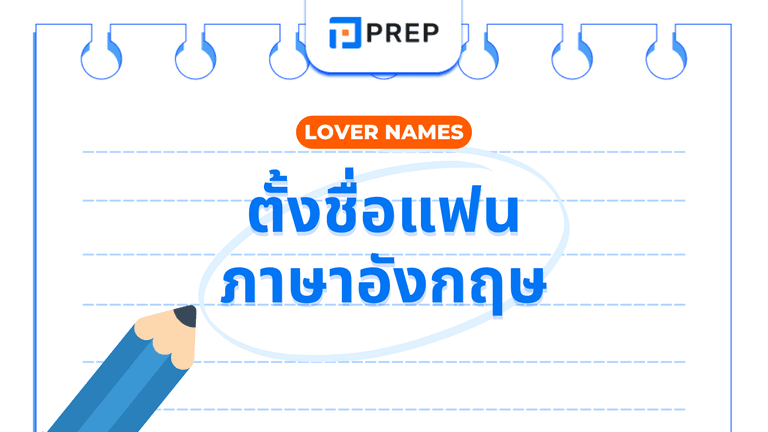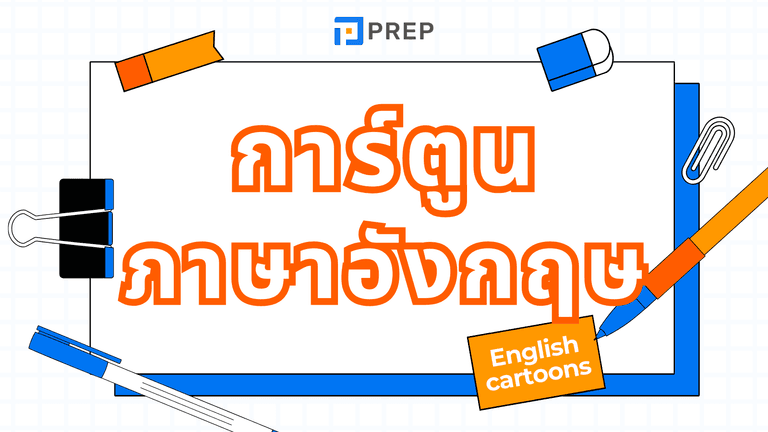รีวิว Academic Vocabulary In Use หนังสือคำศัพท์ฮิต
หากคุณกำลังมองหาที่จะเพิ่มพูนภาษาอังกฤษระดับวิชาการเพื่อเตรียมตัวสอบ IELTS หนังสือ Academic Vocabulary In Use เป็นทรัพยากรที่ขาดไม่ได้ หนังสือเล่มนี้จะให้คุณกับแหล่งคำศัพท์ขั้นสูง พร้อมกับทักษะการใช้งานที่มีประสิทธิภาพสำหรับข้อความวิชาการ มาสำรวจหนังสือ Academic Vocabulary In Use ร่วมกับ PREP กันเถอะ!
- I. บทนำสู่หนังสือ Academic Vocabulary In Use
- II. รีวิวเนื้อหาของหนังสือ Academic Vocabulary In Use
- III. ข้อดีและข้อเสียของหนังสือ Academic Vocabulary In Use
- IV. วิธีการใช้หนังสือ Academic Vocabulary In Use อย่างมีประสิทธิภาพ
- V. ควรซื้อและดาวน์โหลดไฟล์ PDF หนังสือ Academic Vocabulary In Use ที่ไหนดี?
- VI. ทำข้อสอบ IELTS ฝึกหัดเพิ่มเติม!
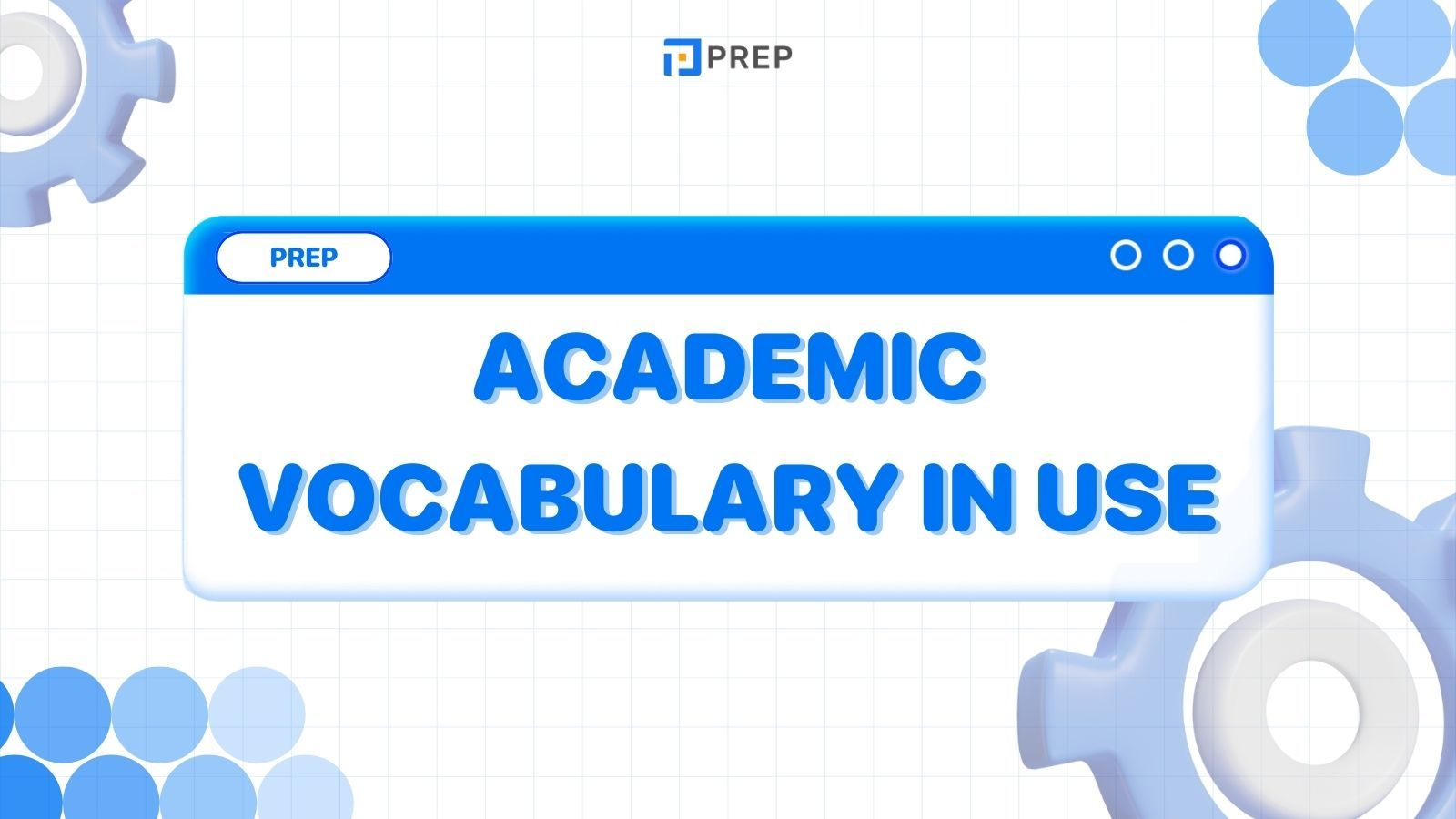
I. บทนำสู่หนังสือ Academic Vocabulary In Use
1. ข้อมูลทั่วไป
หนังสือ Academic Vocabulary In Use เป็นหนังสือเฉพาะทางเกี่ยวกับคำศัพท์ ตลอดหนังสือ ผู้อ่านจะได้รับการแนะนำวิธีการใช้คำศัพท์วิชาการสำหรับวัตถุประสงค์ต่างๆ ตั้งแต่ระดับพื้นฐานไปจนถึงระดับสูง โดยเฉพาะอย่างยิ่งสำหรับการสอบ IELTS Writing
|
2. ผู้เรียนเป้าหมาย
หนังสือ Academic Vocabulary In Use มุ่งเป้าไปที่บุคคลที่ต้องการเพิ่มคำศัพท์ ปรับปรุงความรู้ และพัฒนาทักษะในการใช้คำศัพท์วิชาการ โดยเฉพาะอย่างยิ่งผู้ที่กำลังเตรียมตัวสำหรับการสอบ IELTS หนังสือเล่มนี้ไม่ได้ตั้งใจสำหรับผู้เริ่มต้นหรือผู้ที่มีพื้นฐานภาษาอังกฤษอ่อนแอ เนื่องจากต้องการให้ผู้เรียนมีความเข้าใจที่มั่นคงเกี่ยวกับจำนวนคำศัพท์ทั่วไปและพื้นฐานบางประการ ซึ่งจากนั้นสามารถเปลี่ยนเป็นการใช้งานในระดับวิชาการได้ ดังนั้น กลุ่มเป้าหมายที่เหมาะสมสำหรับหนังสือเล่มนี้ควรเป็นบุคคลที่มีระดับคะแนน IELTS 4.0 ขึ้นไป
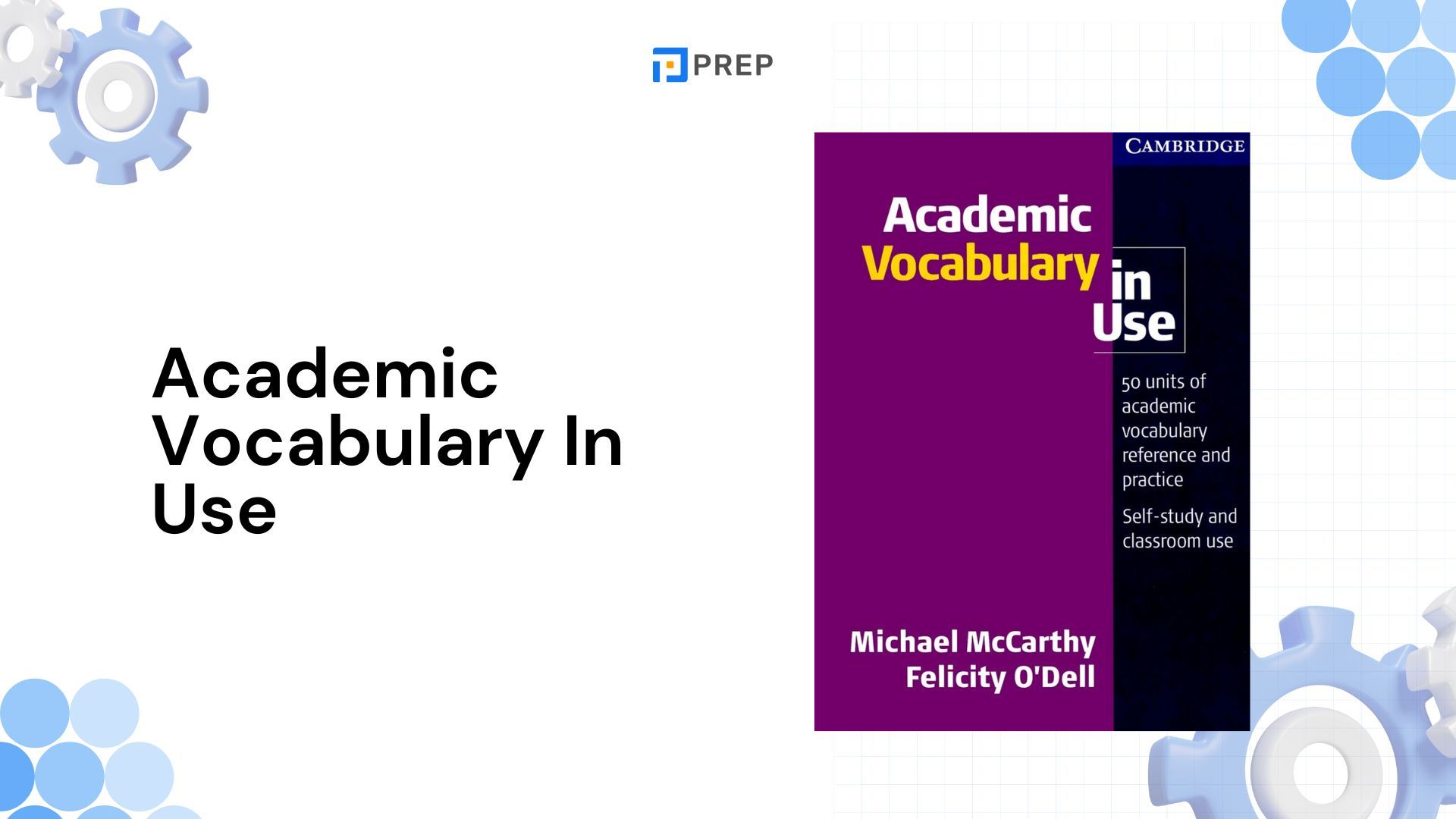
II. รีวิวเนื้อหาของหนังสือ Academic Vocabulary In Use
หนังสือหนังสือ Academic Vocabulary In Use ประกอบด้วย 8 ส่วนต่อไปนี้:
|
ส่วน |
เนื้อหา |
|
ส่วนที่ 1: คำศัพท์วิชาการพื้นฐาน (9 หน่วย)
|
|
|
ส่วนที่ 2: การรวมคำศัพท์วิชาการ, คำนำหน้า, และคำต่อท้าย (7 หน่วย)
|
|
| ส่วนที่ 3: วิธีการใช้คำศัพท์วิชาการในบริบทวิชาการระดับสูง (6 หน่วย) |
|
|
ส่วนที่ 4: คำศัพท์วิชาการที่ใช้ในการตีความสิ่งต่างๆ เช่น ข้อมูล, สาเหตุ, ผลลัพธ์... (8 หน่วย)
|
|
| ส่วนที่ 5: คำศัพท์วิชาการที่ใช้สำหรับการประเมินและวิเคราะห์ความคิดเห็น (7 หน่วย) |
|
| ส่วนที่ 6: คำศัพท์วิชาการที่จัดหมวดตามหน้าที่ (การจัดระเบียบความคิด, การทำการเปรียบเทียบ, การอธิบายการเปลี่ยนแปลง...) (13 หน่วย) |
|
| ส่วนที่ 7: การทดสอบความเข้าใจในการอ่านในบริบทวิชาการ (6 หน่วย) |
|
| ส่วนที่ 8: คำตอบและเนื้อหาอ้างอิง (6 หน่วย) |
|
III. ข้อดีและข้อเสียของหนังสือ Academic Vocabulary In Use
1. ข้อดี
- เนื้อหาของหนังสือ Academic Vocabulary In Use เหมาะสมกับทั้งสอง task ในการเขียน IELTS
- การจัดระเบียบส่วนและบทเรียนเป็นไปอย่างมีวิทยาศาสตร์และตรรกะ มีการนำเสนอความรู้ทฤษฎีที่ชัดเจนและละเอียด
- เน้นการใช้งานผ่านตัวอย่างประโยคและข้อความวิชาการมากมายเพื่อให้นักเรียนได้ฝึกฝนและทบทวน
- การจำแนกคำศัพท์ตามหน้าที่ช่วยให้นักเรียนสามารถเลือกฝึกหน้าที่ที่ต้องการได้อย่างอิสระ ไม่จำเป็นต้องเรียนตามลำดับจากต้นจนจบ
- มีตารางเปรียบเทียบเพื่อช่วยให้ผู้อ่านสามารถแยกแยะความแตกต่างระหว่างฟังก์ชันของคำศัพท์วิชาการและทั่วไปได้
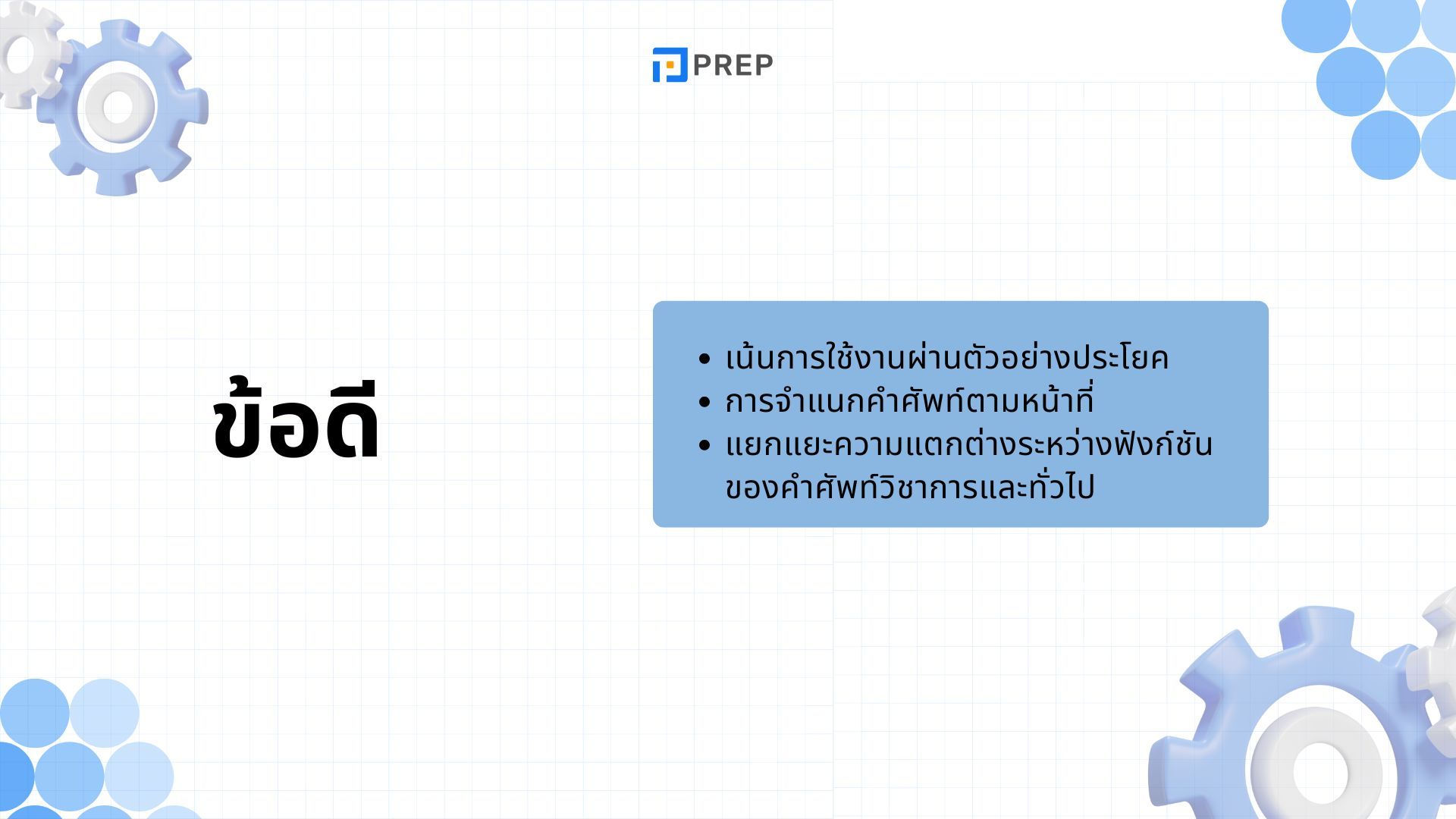
2. ข้อเสีย
- หนังสือ Academic Vocabulary In Use เขียนทั้งหมดเป็นภาษาอังกฤษ ซึ่งอาจทำให้ผู้ใช้ครั้งแรกพบกับความยากลำบาก
- ภาพประกอบยังไม่หลากหลาย และการนำเสนอเนื้อหาข้อความที่หนาแน่นอาจทำให้รู้สึกเบื่อ
- การที่ต้องการให้นักเรียนค้นคว้าและวิเคราะห์การใช้คำศัพท์ด้วยตนเองอาจทำให้รู้สึกท้อแท้ โดยเฉพาะอย่างยิ่งสำหรับการเรียนด้วยตนเองที่บ้าน นอกจากนี้ การค้นหาความหมายของคำศัพท์วิชาการด้วยตนเองอาจนำไปสู่ความเข้าใจผิดหากไม่มีการสนับสนุนหรือแนะนำ
IV. วิธีการใช้หนังสือ Academic Vocabulary In Use อย่างมีประสิทธิภาพ
หนังสือ Academic Vocabulary In Use ให้แหล่งคำศัพท์ขั้นสูงและคุณภาพสำหรับผู้เข้าสอบ IELTS แบบวิชาการ เพื่อใช้หนังสือได้อย่างมีประสิทธิภาพที่สุด PREP ให้คำแนะนำดังนี้:
- ก่อนอื่น คุณต้องทบทวนทั้งหนังสืออย่างสั้นๆ และศึกษาตามลำดับตามคำแนะนำ นอกจากการเรียนรู้คำศัพท์แล้ว นักเรียนควรโฟกัสที่วลี เคล็ดลับ และข้อผิดพลาดทั่วไปเพื่อมีความเข้าใจที่มั่นคง
- ขณะศึกษา คุณควรเตรียมพจนานุกรม เช่น Cambridge Dictionary หรือค้นหาคำศัพท์ออนไลน์จากแหล่งที่เชื่อถือได้เมื่อคุณต้องการตรวจสอบความหมายของคำ
- ทันทีหลังจากเสร็จสิ้นแต่ละบทเรียน คุณควรจดบันทึกคำศัพท์หลัก วลีที่น่าจดจำ และจุดไวยากรณ์ในสมุดบันทึกของคุณ จากนั้นนำไปใช้กับการพูดและการเขียนเพื่อช่วยให้จำได้นานขึ้น คุณควรจดบันทึกคำพ้องความหมายหรือคำตรงข้ามเพื่อหลีกเลี่ยงการตกเป็น "กับดัก" ในการสอบฟังและอ่าน
บางวิธีที่ง่ายและเข้าใจได้ในการจดบันทึกคำศัพท์คือ การใช้ Word bubbles (ฟองคำ) หรือ Word forks (ส้อมคำ) ตามที่แสดงในภาพด้านล่าง:
V. ควรซื้อและดาวน์โหลดไฟล์ PDF หนังสือ Academic Vocabulary In Use ที่ไหนดี?
หนังสือลิขสิทธิ์แท้คือเพื่อนคู่ใจที่เชื่อถือได้ ที่จะช่วยให้คุณก้าวหน้าขึ้นทุกวัน หลีกเลี่ยงหนังสือเถื่อนและหนังสือ Academic Vocabulary In Use PDF ที่มีอยู่ทั่วเน็ต เพราะนั่นไม่เพียงแต่ผิดกฎหมาย แต่ยังทำให้เสียโอกาสในการเรียนรู้อย่างมีประสิทธิภาพด้วยหนังสือมาตรฐาน
มาเลือกหนังสือลิขสิทธิ์แท้กับ PREP เพื่อยอัพสกิลภาษาอังกฤษ:
|
ซื้อที่ร้าน |
คิโนะคูนิยะ ไทยแลนด์ Asia Books … |
|
ซื้อออนไลน์ |
… |
นั่นคือรีวิวอย่างละเอียดของหนังสือ Academic Vocabulary In Use จาก PREP! หวังว่าบทความนี้จะมีประโยชน์สำหรับคุณในการเตรียมตัวสอบ IELTS โดยเฉพาะและการเรียนภาษาอังกฤษโดยทั่วไป!
อ่านเพิ่มเติม:
- ดาวน์โหลดหนังสือ Oxford Word Skills: Basic Intermediate และ Advanced ฟรี
- หนังสือ Destination B1- ชำนาญคำศํพท์และไวยากรณ์ภาษาอังกฤษระดับ B1
VI. ทำข้อสอบ IELTS ฝึกหัดเพิ่มเติม!
แทนที่จะทำข้อสอบฝึกหัดอย่างต่อเนื่องโดยไม่เห็นการปรับปรุงคะแนนของคุณเนื่องจากมุ่งเน้นไปที่ปริมาณเท่านั้น หรือพยายามทำข้อสอบซ้ำแล้วซ้ำเล่าโดยไม่เข้าใจข้อผิดพลาดของคุณ ลองพิจารณาห้องทดสอบ TOEIC ออนไลน์ของ PREP English ภายในไม่กี่วินาที มันให้คะแนนและคำอธิบายคำตอบอย่างครอบคลุม ช่วยให้คุณระบุข้อผิดพลาดได้อย่างง่ายดายและประเมินความสามารถของคุณได้อย่างแม่นยำ นอกจากนี้ ฟังก์ชันตัวจับเวลายังจำลองความกดดันในห้องสอบ ช่วยในการปรับตัวเข้ากับสภาพแวดล้อมการทดสอบ
คุณยังไม่แน่ใจกับรูปแบบข้อสอบ IELTS หรือ TOEIC งั้นเหรอ? ความกังวลแบบนี้อาจทำให้ผลสอบไม่เป็นไปตามที่หวังได้นะ ทดลอง สอบ IELTS และ ทดสอบ TOEIC ฟรี กับ PREPEDU จะพาคุณเข้าสู่บรรยากาศการสอบจริง ฝึกทุกประเภทคำถามและจัดการเวลาให้คล่องขึ้น
เรามีคลังแบบทดสอบมากกว่า 1,000 ข้อที่คัดสรรมาอย่างดี อัปเดตตามแนวข้อสอบใหม่ล่าสุดอยู่เสมอ เทคโนโลยี AI จะชี้จุดอ่อนของคุณแบบเฉพาะเจาะจง พร้อมสร้างแผนพัฒนาที่ใช่สำหรับคุณ ระบบจะติดตามผลลัพธ์เป็นข้อมูลดิจิทัล คุณจึงมองเห็นความเปลี่ยนแปลงได้ง่ายดาย
อย่ารอช้า! มาเริ่มต้นฝึกซ้อมและปลดปล่อยศักยภาพของคุณกันเถอะ ลองฝึก ทํา ข้อสอบ IELTS และ TOEIC practice ของ PREPEDU วันนี้เลย

สวัสดีค่ะ ฉันชื่อมุก ปัจจุบันดูแลด้านเนื้อหาผลิตภัณฑ์ของ Prep Education ค่ะ
ด้วยประสบการณ์มากกว่า 5 ปีในการเรียน IELTS ออนไลน์ด้วยตนเอง ฉันเข้าใจดีถึงความท้าทายที่ผู้เรียนต้องเผชิญ แล้วก็รู้ว่าอะไรที่มันเวิร์ก
มุกอยากเอาประสบการณ์ตรงนี้มาช่วยแชร์ แล้วก็ซัพพอร์ตเพื่อน ๆ ให้ได้คะแนนที่ดีที่สุดค่ะ
ความคิดเห็น
เนื้อหาแบบพรีเมียม
ดูทั้งหมดบทความที่เกี่ยวข้อง
แผนการเรียนรู้ส่วนบุคคล
อ่านมากที่สุด
ติดต่อ Prep ผ่านโซเชียล





